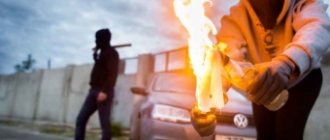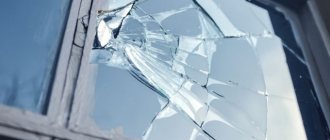Article 167 of the Criminal Code of the Russian Federation “Deliberate destruction or damage to property” faces a maximum of 5 years in prison. But the difficulty of this article is different: very often mistakes are made during qualification. That is, this crime is very similar to some other crimes, and it is difficult for investigators to determine what kind of crime was committed.
To solve a criminal case, investigators perform the so-called. investigative actions. That is, interrogations, searches, confrontations, examinations. The Code of Criminal Procedure describes the rules by which these investigative actions are conducted. But the investigator is always tempted to break these rules in order to make his job easier. And sometimes - to “pull some evidence by the ears” and achieve a guilty verdict.
It is important to know: our criminal lawyers will be able to quickly stop the illegal actions of investigators. We file complaints and motions to exclude evidence at the preliminary hearing. At the link below you can read how we help our clients with various investigative actions. There are no templates in criminal cases - it is important to correctly analyze your case and build the most correct defense position.
What is destruction or damage to property from a legal point of view?
Article 167 of the Criminal Code of the Russian Federation “Deliberate destruction or damage to property” consists of 2 parts. Part 1 – “deliberate destruction or damage to someone else’s property, if these acts caused significant damage.” For example, breaking glass in a store with a stone or breaking someone’s phone - this will be part 1 of Article 167 of the Criminal Code of the Russian Federation.
It is important to know: significant damage is a relative concept. For people with different incomes, the significant damage will be different amounts. For some, 30,000 rubles is not a lot of money. Note No. 2 to Article 158 of the Criminal Code of the Russian Federation established that significant damage cannot be less than 2,500 rubles and depends on the property status of the victim.
Part 1 of Article 167 of the Criminal Code of the Russian Federation “Deliberate destruction or damage to property” is a crime of minor gravity. Punishment is a fine of not more than 40,000 rubles or imprisonment for up to 2 years. There are other types of punishment, but we won’t talk about them.
Part 2 of Article 167 of the Criminal Code of the Russian Federation “Deliberate destruction or damage to property” is already more serious. This is also damage or destruction of property, but with the help of:
- arson;
- explosion;
- in any other dangerous way;
- resulting in the death of a person;
- leading to grave consequences.
It is important to know: serious consequences are considered to be the infliction of moderate harm to the health of 2 or more people; causing serious harm to the health of 1 person or more; if the victims were left without housing or means of subsistence; if any enterprise or organization is out of order for a long time or if consumers are left without electricity, gas, heating, or water for a long period of time. This is stated in paragraph 10 of the Resolution of the Plenum of the Supreme Court of the Russian Federation dated June 5, 2002 No. 14.
You can't get away with a fine here. The court will impose correctional labor or imprisonment. But no more than 5 years.
It is important to know: it turns out that leaving people without gas or water for a long time is as dangerous a crime as unintentionally causing the death of a person, for example, by arson. The punishment is the same - imprisonment for a maximum of 5 years.
How to determine the extent of damage
To assign punishment and compensation for damage to the victim, the cost of the damage must be correctly assessed.
For this purpose, the investigator orders an examination.
It is carried out by an organization that has the appropriate license.
The expert takes into account such points as:
- how much the item costs on the market at the moment;
- what is the percentage of depreciation of the property;
- Is it possible to restore or will I have to purchase a new item?
Most often, as part of a criminal case, an examination of the following property is carried out:
- Cars. If the damage is minor, then it is easy to assess the damage. Problems arise when the car is completely destroyed after a fire. Then the year of manufacture of the car, mileage, time spent in ownership, information about the accident in which the car was involved, and the cost of a car with similar characteristics must be taken into account.
- Household appliances, musical equipment, phones, tablets.
It is advisable that the victim keep the receipt for the purchase. Then the examination will take into account the year of production and the real price of the item. If there is no receipt, then the average price in stores at the time of purchase is taken as the basis. - House, building, store and other real estate. If the property is completely lost, then the price according to the cadastre on the day the offense was committed is taken. When a part of the house is damaged (windows, doors, roof, internal contents), then the prices for finishing materials in stores, the price for repair services, and the likelihood of restoration to its original condition are studied.
Luxury items: jewelry, furs, leather, paintings, etc.
Usually a person keeps receipts for these goods, so the expert is guided by the amount for which they were purchased.
Sample statement to the police about property damage.
Some interesting and important points
The question arises - what will happen if property worth less than 2,500 rubles is destroyed? Or, although more than 2,500 rubles, there is no significant damage? The answer is simple: it will no longer be a crime, but just an offense. This is Article 7.17 of the Code of Administrative Offenses of the Russian Federation, and not Article 167 of the Criminal Code of the Russian Federation “Deliberate destruction or damage to property.”
It is important to know: our lawyer will make every effort to ensure that the case is classified as such - under Article 7.17 of the Code of Administrative Offenses of the Russian Federation. The punishment there is a fine of 300 to 500 rubles.
Case from practice: Citizen A. damaged the property of family B.: the front door worth 500 rubles and window glass worth 1050. In total, he caused damage worth 1550 rubles. And the investigator decided that this was part 1 of Article 167 of the Criminal Code of the Russian Federation “Deliberate destruction or damage to property”, the accused was convicted. Although it is immediately clear that there is no criminal case here, because for there to be one, the damage must be no less than 2,500 rubles. The case reached the Supreme Court and only it overturned the illegal verdict.
It is important to know: this is an example of the work of an investigator and a prosecutor. After all, not a single case goes to court without the permission of the prosecutor. Both the investigator and the prosecutor committed lawlessness. The job of a criminal lawyer at our company is to ensure that this does not happen to you.
Another example: K. was convicted of several articles, including part 1 of article 167 of the Criminal Code. He tried to take possession of someone else's car, and to do this he broke the glass in it. Damage - 2,700 rubles, this happened a long time ago. Of course, the investigator immediately “seized” on the figure: since it’s more than 2,500 rubles, it means significant damage. But it was not there. The Judicial Collegium for Criminal Cases of the Supreme Court ruled that the “significance” of the damage had not been proven: “the verdict does not provide information to substantiate the conclusion that damage in the amount of 2,700 rubles was caused to the owner of the car. is significant for him." The court commuted the punishment by removing part 1 of Article 167 of the Criminal Code from the sentence.
Of course, if the damage caused is more than 2,500 rubles, then the investigator “automatically” considers that this is significant damage. In this case, the investigation ignores the property status of the victim. Even if the victim himself declares that the damage to him is insignificant, the investigator still initiates a case under Part 1 of Article 167 of the Criminal Code of the Russian Federation. We need to do some statistics.
Arbitrage practice
Many cases of property damage are intentionally related to conflict situations that arise between people. This is especially common among road users.
One of the high-profile criminal cases is a traffic conflict between two well-known individuals: deputy Igor Amural and former law enforcement officer Sergei Kovalenko.
In connection with the conflict between citizens due to an accident, one of them intentionally caused damage to the property of the second defendant (second part of Article 167 of the Code), in response to which the second participant in the proceedings caused the following types of harm to his opponent:
- Mild harm to health.
- Causing retaliatory damage to a car (the first part of the article under consideration).
Information about which crimes specifically were charged with which of the participants was not disclosed to the public.
The materials of the case under consideration were transferred to the court, but the judicial authority returned them for further investigation due to insufficient evidence.
Criminal penalties can be avoided legally
Part 1 of Article 167 of the Criminal Code of the Russian Federation “Deliberate destruction or damage to property” is a crime of minor gravity, and part 2 is of medium gravity. The Criminal Code provides 3 opportunities to avoid criminal liability.
1. Exemption from liability due to active repentance (Article 75 of the Criminal Code of the Russian Federation). In order for the court to apply this article and release the accused from punishment, it is necessary:
- that the crime was committed for the first time;
- so that it is of small or medium severity (this is our case);
- confess;
- help the investigator solve the crime, that is, give truthful and complete testimony;
- make amends for the harm caused (that is, compensate the losses to the victim).
2. Exemption from liability in connection with reconciliation with the victim (Article 76 of the Criminal Code of the Russian Federation). Just as in the first case, it is required that:
- the crime was committed for the first time;
- crime of minor or moderate gravity;
- the damage caused was made up, that is, the victim was compensated for losses;
- the victim agreed to make peace.
3. Exemption from liability due to the expiration of the statute of limitations (Article 78 of the Criminal Code of the Russian Federation). No one can be held accountable or convicted if 2 years or more have passed since the commission of a minor crime. The same applies to a crime of medium gravity, but in this case 6 years or more must pass.
It’s important to know: everything seems simple. But in reality, there are “pitfalls” that can appear during interrogation by an investigator or directly in court, which is even worse. And now you were hoping for a successful outcome, but instead you face a real sentence. Surprises in a criminal case are bad surprises, and it is better not to have them. An experienced criminal lawyer will ensure that there are no surprises.
Damage to property article of the Criminal Code of the Russian Federation
Damage to property (Article 168) provides for intentional damage to property. The property is of material value, and its damage entails damage to the victim. Damage to property means its physical liquidation if it ceases to exist altogether or loses its economic significance. Property can be damaged by destruction, burning, or dissolution in sulfuric acid. Items such as fuel, fuel, food cannot be considered in this article. Taking possession of such items is already theft.
Aggravating features
These are considered:
- arson of someone else's property (movable or immovable);
- explosion, flooding;
- As a result of damage to other people's property, people were injured or died.
Attention! If the crime was committed by several persons who discussed a plan of action in advance, this is also an aggravating circumstance.
When additional means or devices are used to commit a crime, the offender receives a more severe punishment.
When is an examination scheduled?
It is mandatory to hold a person accountable for a fire that causes serious property damage. But it will not be easier for the injured party if the criminal goes to prison, because someone must compensate for the damage. This is why you should apply for an examination.
This procedure should be carried out as early as possible. The first examination is usually done free of charge, but if a person turns to private specialists, he must pay for it himself. Repeated examinations are also usually paid. For example, assessing material damage when a car is set on fire will cost an average of 20 thousand rubles. And the procedure will take several days.
Step-by-step instructions for action after a car is set on fire
After discovering that a car has been set on fire, the owner must follow a certain algorithm of actions:
- Call the Ministry of Emergency Situations brigade to the scene. For a mobile phone, 112 (a single number intended for calling emergency services) or 101, and for a landline phone - 01.
- Try to limit access to the burning car by unauthorized persons.
- Check with the Ministry of Emergency Situations employee in which department you can obtain a document confirming the fact of a vehicle fire.
- Call the nearest police station to the scene of the car arson.
- Notify the insurance company representative about the incident.
- Obtain a fire report and submit it to the insurance company.
- File a report at the nearest police station.
- Obtain a certificate from a police officer about the incident (for a representative of the insurance company). The certificate must clearly indicate the time and place of the arson.
- Do not refuse to initiate criminal proceedings. Even if the vehicle suffered minor damage and the cost of repair work will be only a few thousand rubles.
- If the district police officer accepted the application and initiated a criminal case, then you should receive a copy of this paper.
- In case of refusal to initiate a criminal case, the police officer is also obliged to issue a copy of this document. The victim has the right to familiarize himself with the results and materials of the inspection.
- Having in hand an official refusal to initiate a criminal case, you need to write a statement to the prosecutor's office in order to appeal the police decision. After 30 days, the prosecutor's office must officially notify the victim of the actions taken.
Please
take the help of a qualified lawyer. He will not only suggest the optimal solution in the event of a car being set on fire, but will also help to correctly draw up an application to the prosecutor’s office or ensure that the received certificates contain all the information necessary for the insurance company and the court.




